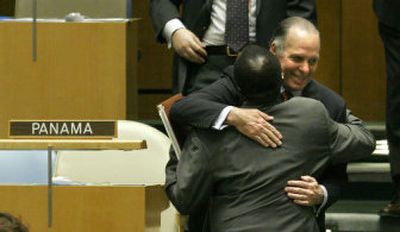Panama wins 2-year seat on U.N. Security Council

UNITED NATIONS – Panama won a seat on the U.N. Security Council with the 48th ballot Tuesday after U.S.-backed Guatemala and Venezuela, led by leftist anti-American President Hugo Chavez, dropped out to end a deadlock.
Panama got 164 votes in the 192-member U.N. General Assembly, more than the 120 needed to win a two-year term starting Jan. 1 on the United Nation’s most powerful body. Venezuela got 11 votes, Guatemala 4 votes and Barbados 1 vote.
The race for the council seat, which began Oct. 16, became highly political because of the U.S. support for Guatemala and Chavez’s speech at the General Assembly in September in which he called President Bush “the devil.” A number of countries said Chavez’s anti-Bush comments hurt Venezuela’s chances.
Guatemala led Venezuela in all but one of the 47 ballots but couldn’t muster the two-thirds support needed to win in the General Assembly. The standoff was the third-longest battle for a seat on the Security Council in the United Nation’s 61-year history.
General Assembly President Sheikha Haya Rashed Al Khalifa, who announced the results, said she was “delighted” that all five new members of the Security Council had now been chosen – Belgium, Indonesia, Italy, Panama and South Africa.
Panama’s election was assured last week when the foreign ministers of Guatemala and Venezuela met and agreed to withdraw in favor of the Central American nation, which they called a bridge between the northern and southern nations in Latin America.
Panama’s U.N. ambassador, Ricardo Alberto Arias, has said his country presented its name in “a spirit of understanding the different conflicts that there are in the world, especially those caused by cultural and religious differences.”
Arias stressed that together with Peru, whose term on the council goes through 2007, Panama will defend the interests of Latin American and Caribbean countries.
The Security Council has five permanent members – Britain, China, France, Russia and the United States. The other 10 seats, filled for two-year terms, are portioned out to the five United Nations regional groups.